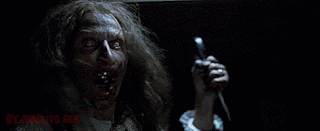Okay, time for the unpopular
opinion: I don’t like The Conjuring.
Everyone knows the spin-off sucks (update:
the reaction to Annabelle 2, released
the same weekend I’m editing and uploading this for later posting, has been
better), and I somewhat enjoyed the second film. But the original is just unenjoyable to me. My problems boil down to three things:
* I don’t buy Ed and Lorraine Warren
(Patrick Wilson and Vera Farmiga) or their worldview. It’s a black-and-white way of looking at the
world that kills my suspension of disbelief.
This is a personal thing, yes, but if God, the Devil, demons, and angels
are all real, I think they have more interesting things to do than knocking on
a door three times, over and over again, to mock their opposing faction.
*While the era was great at
producing horror movies, I find that horror movies set in the 1970s often don’t
work. It’s something about the hair and
the clothes. The entire world just looks
unreal to me, like a sitcom with no budget for wardrobe.
*More specific to this movie, we get
the parts of both a serious thriller and a B-movie. We spend most of the film building up with
investigation of the paranormal, and then get a cheesy, over-the-top CGI-fest
of a climax.
Now, this isn’t to say that there
aren’t scary moments. There certainly
are, and I honestly would have preferred that the movie stick to its boring but
creepy dramatic route. Many real-world
haunting stories are scary because they ultimately don’t make a lot of sense,
while The Conjuring movies seem quite determined to wrap things up in a
neat little package, even when the actual events that inspired the movie were
far less clear-cut.
Roger and Carolyn Perron (Ron
Livingston and Lili Taylor) move into an old farm house with their five
children. Strange events start
happening, with the usual knocks, movements, and kids reporting imaginary
friends. There is a particularly
frightening sequence in which Carolyn plays a version of hide-and-seek called
“three claps” with one of her daughters, and finds herself drawn into another room
by an unexplained clap.
Ed and Lorraine are called on the
scene, however, and ironically do exactly what they always did in real life:
give everything that happens a demonic explanation in terms of their
interpretation of Catholic theology.
Rather than the male ghost indicated earlier, we now have a nominally
female demon who possessed a previous owner of the property and forced her to
kill her own baby in a sacrifice to the devil (but for some reason they keep
referring to the demon as “Bathsheba,” the name of the woman).
In the final act, the witch
possesses Carolyn Perron in an attempt to kill her children. This kills any remaining suspension of belief
as suddenly every half-baked theory the Warrens put forward is completely
confirmed, and all ambiguity is gone. It
also turns the evil force into something that can be tangibly fought, as Ed Warren
attempts to perform an exorcism himself.
This is something the real Ed Warren
claims to have done, but I know enough about exorcisms to know they’re never
really the fast epiphany therapy movies portray. Here, however, we get the standard gross-out,
hurt the victim, and it’s all fixed by the power of love ending. It’s too tangible, too easy, and generally
too Hollywood for a truly scary movie.
So, do I recommend The Conjuring? No. I didn’t like it in theatres, and I don’t
like it now. Whether you want drama or
B-movie, there are far better choices available. The Conjuring 2 is among them.



